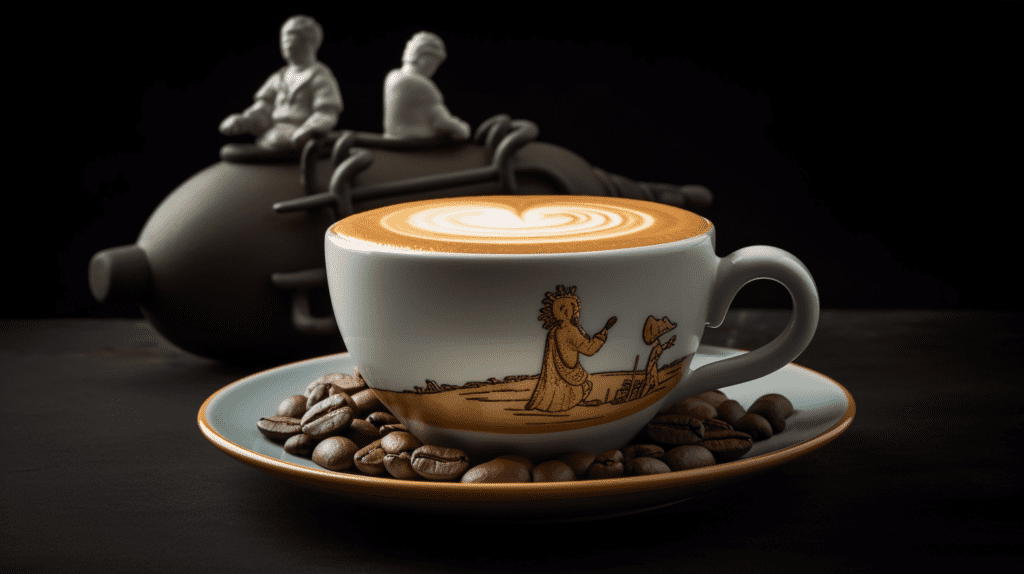Cappuccino
What Does a Cappuccino Do to Your Body

Hey there! Ever wondered what happens to your body after you sip on that creamy, frothy cappuccino?
Well, get ready for a jolt of information! In this article, I’ll break down the immediate and long-term effects of this beloved coffee beverage on your body.
From how it impacts your nervous system to its influence on heart health, we’ll explore it all.
So, grab your favorite mug and let’s dive into the fascinating world of cappuccino and its effects on your overall well-being.
Key Takeaways
- Cappuccino boosts energy and alertness due to caffeine stimulation.
- Cappuccino can have a temporary increase in blood pressure and may affect heart health.
- Caffeine in cappuccino stimulates the nervous system and can disrupt sleep patterns if consumed excessively.
- Regular consumption of cappuccino can lead to dependence, addiction, and potential negative effects on overall well-being.
The Immediate Effects of Cappuccino on Your Body
After drinking a cappuccino, I can feel the immediate effects on my body. The first thing I notice is a sudden boost of energy and alertness. It’s like a jolt of motivation that helps me tackle my day. This increased energy is due to the caffeine in the cappuccino. Caffeine stimulates the central nervous system, making me feel more awake and alert.
In addition to the energy boost, I also experience a temporary increase in blood pressure. This is because caffeine causes blood vessels to constrict, which can lead to a slight rise in blood pressure. However, it’s important to note that this increase is usually temporary and not significant enough to cause concern for most individuals.
Overall, drinking a cappuccino gives me an immediate pick-me-up, providing me with the energy and focus I need to start my day.
Caffeine and Its Impact on Your Nervous System
Drinking coffee with caffeine stimulates my nervous system, increasing my alertness and productivity. Caffeine is a natural stimulant that blocks adenosine, a neurotransmitter that promotes sleep and relaxation. When consumed, caffeine binds to adenosine receptors in the brain, preventing adenosine from doing its job. As a result, I feel more awake and focused.
However, it’s important to note that caffeine tolerance can develop over time. This means that the more I consume caffeine, the less sensitive I become to its effects. To avoid this, it’s recommended to moderate caffeine intake and take occasional breaks to reset tolerance.
Additionally, consuming caffeine too close to bedtime can disrupt sleep patterns. It’s advised to limit caffeine consumption in the evening to ensure a good night’s sleep.
How Cappuccino Affects Your Digestive System
My stomach feels unsettled after indulging in a creamy cappuccino. This digestive discomfort is likely due to the combination of caffeine and the milk in the cappuccino.
When we consume caffeine, it stimulates the production of stomach acid, which can lead to feelings of indigestion and discomfort. Additionally, the milk in the cappuccino contains lactose, a sugar that can be difficult for some people to digest, leading to bloating and gas.
The caffeine in the cappuccino also affects the absorption of nutrients in the digestive system. It can interfere with the absorption of minerals like calcium, iron, and zinc.
The Influence of Cappuccino on Your Heart Health
I’ve noticed that drinking cappuccinos regularly has a significant impact on my heart health, as it raises my heart rate and increases my risk of cardiovascular issues.
Here are four ways that cappuccinos can affect your heart health:
-
Increased heart rate: Caffeine, which is present in cappuccinos, can stimulate the nervous system, leading to an increase in heart rate. This can put additional strain on the heart and potentially lead to heart problems.
-
Blood pressure regulation: Caffeine consumption can cause a temporary increase in blood pressure. For individuals with high blood pressure or pre-existing cardiovascular conditions, this can be particularly concerning.
-
Cardiovascular function: Studies have shown that excessive caffeine intake can impair the function of blood vessels, leading to reduced blood flow and potentially increasing the risk of cardiovascular disease.
-
Dehydration: Cappuccinos, like other caffeinated beverages, have diuretic effects, meaning they can increase urination and potentially lead to dehydration. Dehydration can negatively impact heart health by increasing the workload on the heart.
Considering these potential effects, it’s important to be mindful of your cappuccino consumption and its impact on your heart health.
Long-term Effects of Regular Cappuccino Consumption on Your Overall Well-being
The regular consumption of cappuccinos can have long-term effects on your overall well-being, and it’s important to be aware of the potential risks. While cappuccinos may be a delicious and indulgent treat, they can also have psychological effects and impact your bone health in the long run.
Psychologically, regular cappuccino consumption can lead to dependence and addiction due to its caffeine content. Caffeine is a stimulant that can increase alertness and temporarily improve mood. However, excessive consumption can disrupt sleep patterns, cause anxiety, and even contribute to the development of mental health disorders.
In terms of bone health, the long-term effects of cappuccino consumption are concerning. Caffeine has been shown to increase calcium excretion from the body, which can lead to a decrease in bone density over time. This puts individuals at a higher risk for osteoporosis and fractures.
To maintain optimal well-being, it’s important to consume cappuccinos in moderation and consider alternatives with less caffeine. Prioritizing a balanced diet and engaging in weight-bearing exercises can also help mitigate the potential negative effects on bone health.
Frequently Asked Questions
How Many Calories Are in a Typical Cappuccino?
A typical cappuccino contains around 120-180 calories. While it can be a tasty treat, it’s important to consider the calories if you’re watching your weight. Moderation is key for weight loss effects.
Can Drinking Cappuccino Help With Weight Loss?
Drinking cappuccino can potentially boost metabolism and help suppress appetite. However, it’s important to note that weight loss is a complex process and cannot be solely attributed to cappuccino consumption.
Does Cappuccino Have Any Impact on Bone Health?
As a cappuccino lover, I wondered about its impact on bone health. Turns out, cappuccino can affect calcium absorption, which is crucial for strong bones. So, moderation is key to prevent osteoporosis.
Can Drinking Cappuccino Increase the Risk of Developing Ulcers?
Drinking cappuccino can increase stomach acid production, potentially increasing the risk of developing gastric ulcers. Coffee, including cappuccino, has been associated with gastric ulcers due to its acidity and ability to stimulate acid secretion.
Does Cappuccino Have Any Effect on the Immune System?
Cappuccino can boost the immune system due to its caffeine content. Research suggests that moderate caffeine consumption may enhance immune function. So, enjoy your cappuccino for a potential immune health benefit!
Conclusion
In the grand symphony of life, a cappuccino can be seen as a harmonious conductor, orchestrating a delicate balance within our bodies.
Its caffeine content awakens our nervous system, energizing our senses.
As it dances through our digestive system, it stimulates the release of enzymes, aiding in digestion.
Like a gentle breeze, it caresses our heart, improving its function.
With regular consumption, this symphony becomes a timeless masterpiece, enhancing our overall well-being.
So indulge in a cappuccino, and let its symphony bring harmony to your body.
Arf, an author and an innovative enthusiast of coffee, coffee alternatives, and tea, plays a crucial role as a contributor to the esteemed Cappuccino Oracle platform. Renowned for his curiosity and passion for these captivating beverages, Arf has carved out a unique space for himself in the world of exploration and writing. He realized that coffee, coffee alternatives, and tea are not mere drinks to keep one awake, but universes of flavors and stories waiting to be explored.
Arf’s articles for Cappuccino Oracle blend meticulous research with personal experiences, providing readers with an in-depth understanding of various types of coffee, coffee alternatives, and tea, along with their unique characteristics, cultures, and histories. His honest reviews and engaging narratives guide readers on their own journeys, helping them discover their preferences and find their perfect brew.
Cappuccino
Discover the Rich History and Perfect Techniques Behind the Irresistible Cappuccino

I have always thought that a delicious cup of cappuccino has the ability to improve any day. With its bold espresso and creamy steamed milk, it’s a soothing treat that never fails to brighten my mood.
In this article, I’ll share the origins of cappuccino, a traditional recipe, and techniques for perfecting your own cup. Whether you’re a coffee connoisseur or simply enjoy a good brew, get ready to elevate your cappuccino game to new heights.
Key Takeaways
- Cappuccino originated in Italy in the 17th century and was enjoyed by the upper class.
- The name ‘cappuccino’ is believed to have come from the Capuchin friars.
- The traditional recipe consists of equal parts espresso, steamed milk, and milk foam.
- Steaming the milk at the ideal temperature and pouring it slowly creates a creamy and frothy texture.
The Origins of Cappuccino
I love learning about the origins of cappuccino and how it became such a popular coffee drink.
The history of cappuccino dates back to the 17th century in Italy. It’s believed that the name ‘cappuccino’ was derived from the Capuchin friars, who wore brown hoods that resembled the color of the coffee.
Initially, cappuccino was made with equal parts of espresso, steamed milk, and milk foam. It was a drink enjoyed by the upper class and was often served after dinner.
Over time, cappuccino spread across Europe and eventually made its way to America. Today, it has become a staple in coffee shops worldwide, reflecting the influence of Italian culture on coffee consumption around the globe.
The history and culture behind cappuccino make it a fascinating and beloved beverage.
Traditional Cappuccino Recipe
Sometimes, I like to make a traditional cappuccino using the classic recipe of equal parts espresso, steamed milk, and milk foam. This iconic drink has been a staple in coffeehouse culture for decades, known for its perfect balance of flavors and velvety texture. When crafting my cappuccino, I start by pulling a shot of rich espresso, with its bold aroma and intense flavor. Then, I carefully steam the milk to create a creamy and frothy texture. Finally, I pour the milk over the espresso, creating the perfect ratio of coffee to milk. The result is a delightful beverage that combines the strong notes of espresso with the smoothness of steamed milk. It’s no wonder that the classic cappuccino continues to be a favorite among coffee lovers in the vibrant coffeehouse culture.
Espresso Steamed Milk Milk Foam Rich Creamy Frothy
Techniques for Steaming Milk
To achieve the perfect texture, it’s important to carefully steam the milk with the correct technique. Steaming milk is a crucial step in creating a delicious cappuccino or latte.
Here are some common mistakes to avoid and some milk frothing tools to help you achieve that velvety smooth microfoam:
-
Not using fresh, cold milk: Fresh milk produces the best results, so avoid using milk that has been sitting out for too long.
-
Incorrect temperature: The ideal steaming temperature for milk is between 140-160°F. Anything above or below can affect the taste and texture.
-
Improper positioning of the steam wand: Position the steam wand slightly off-center and just below the surface of the milk to create a whirlpool effect.
-
Oversteaming: Oversteaming the milk can result in large bubbles and a thin, frothy texture. Aim for small, uniform bubbles.
-
Using the wrong frothing tools: Invest in a good quality frothing pitcher and thermometer to ensure precision and consistency in your milk steaming process.
Creative Cappuccino Variations
Experimenting with unique flavor combinations and adding a touch of creativity can elevate your cappuccino variations to new levels of deliciousness. When it comes to cappuccinos, the possibilities are endless. From classic vanilla and caramel to more adventurous flavors like lavender and gingerbread, there are plenty of options to suit every taste.
But it’s not just about the flavors; presentation is also key. Cappuccino art has become increasingly popular, with baristas showcasing their skills by creating intricate designs on the foam. Whether it’s a heart, a leaf, or even a cute animal, these little details add an extra touch of beauty to your cup.
Tips for Perfecting Your Cappuccino
I love adding a dash of cinnamon and a sprinkle of cocoa to my cappuccino, it’s the perfect way to enhance the flavor. But there’s more to a perfect cappuccino than just the taste.
Achieving the ideal foam consistency and mastering latte art techniques are essential for a truly exceptional cup of coffee. Here are some tips to help you perfect your cappuccino:
- Use fresh, high-quality espresso beans for the best flavor.
- Froth the milk to achieve a creamy and velvety texture.
- Pour the milk slowly and steadily into the espresso to create a beautiful layered effect.
- Experiment with different designs for latte art, like hearts, rosettas, or even intricate patterns.
- Practice your technique to ensure consistent and impressive results every time.
By paying attention to foam consistency and mastering latte art techniques, you can elevate your cappuccino experience and impress your friends with your barista skills.
Frequently Asked Questions
What Is the Caffeine Content in a Cup of Cappuccino?
The caffeine content in a cup of cappuccino can vary depending on the size and the type of coffee used. However, compared to other caffeinated beverages, cappuccino generally has less caffeine.
Can I Make Cappuccino Without an Espresso Machine?
Can I make cappuccino without an espresso machine? Absolutely! There are alternative methods for making cappuccino at home, such as using a French press or a handheld milk frother. It’s all about finding what works for you.
What Is the Difference Between a Cappuccino and a Latte?
The difference between a cappuccino and a latte lies in the ratios of espresso, steamed milk, and foam. While a cappuccino has equal parts of each, a latte has more steamed milk and less foam.
Are There Any Health Benefits Associated With Drinking Cappuccino?
Drinking cappuccino may have some health benefits, but it’s important to be cautious. Consuming too much can lead to potential risks, and it may also impact sleep quality. Moderation is key.
Can I Use Plant-Based Milk Alternatives for Making Cappuccino?
Yes, you can definitely use plant-based milk alternatives for making cappuccino. There are various options like almond milk, soy milk, and oat milk that can be used to create delicious and creamy alternative coffee beverages.
Conclusion
In the world of coffee, cappuccino stands as a timeless classic. Its origins, steeped in Italian tradition, have paved the way for endless creative variations. With the perfect balance of steamed milk and expertly pulled espresso, a cappuccino becomes a symphony of flavors, a rich and creamy dance on the taste buds.
So, whether you prefer a traditional recipe or a unique twist, mastering the art of cappuccino will always bring joy to your mornings.
Arf, an author and an innovative enthusiast of coffee, coffee alternatives, and tea, plays a crucial role as a contributor to the esteemed Cappuccino Oracle platform. Renowned for his curiosity and passion for these captivating beverages, Arf has carved out a unique space for himself in the world of exploration and writing. He realized that coffee, coffee alternatives, and tea are not mere drinks to keep one awake, but universes of flavors and stories waiting to be explored.
Arf’s articles for Cappuccino Oracle blend meticulous research with personal experiences, providing readers with an in-depth understanding of various types of coffee, coffee alternatives, and tea, along with their unique characteristics, cultures, and histories. His honest reviews and engaging narratives guide readers on their own journeys, helping them discover their preferences and find their perfect brew.
Cappuccino
The Cultural History Of Cappuccino: A Perfect Morning Cup

Beginning my day with a cappuccino is something I truly enjoy. Its luxurious fragrance, creamy feel, and the ideal mix of espresso, steamed milk, and foam create the perfect morning treat.
But have you ever wondered about the cultural history behind this beloved beverage? Well, let me take you on a journey through time as we explore the origins, evolution, and popularity of cappuccino.
Dating back more than 400 years, cappuccino has its roots in Austria and Italy, where it was named after the Capuchin friars. Over the years, it has transformed from a simple coffee drink to a work of art, thanks to the invention of the espresso machine.
Today, cappuccino is enjoyed not only in the morning, but throughout the day, in various settings, from local cafes to high-end coffee shops.
So, grab your favorite mug, sit back, and join me as we delve into the cultural history of cappuccino – the perfect morning cup.
Key Takeaways
- Cappuccino originated in Austria and Italy and is named after the Capuchin friars.
- The modern version of cappuccino evolved after the invention of the espresso machine.
- Cappuccino is traditionally a morning drink but is now enjoyed throughout the day.
- Cappuccino can be customized with flavorings and can be enjoyed in various settings.
Origin and Evolution
I know that cappuccino originated in Austria as kapuziner and in Italy as cappuccino, named after the Capuchin friars, and evolved into its modern form after the invention of the espresso machine. The influence of these two countries can still be seen in the way cappuccino is enjoyed today.
In Austria, the kapuziner was made with equal parts coffee and milk, while in Italy, cappuccino was made with equal parts espresso, steamed milk, and milk foam. This traditional recipe is still followed in many places, but there are also modern variations that have emerged.
Some variations include using hot milk instead of steamed milk, adding flavorings such as vanilla or caramel, or even using cream instead of milk. These variations have made cappuccino a versatile and customizable drink that can be enjoyed by coffee lovers all over the world.
Ingredients and Preparation
Crafting a cappuccino involves combining carefully measured amounts of espresso, steamed milk, and velvety milk foam. The choice of milk for a cappuccino is crucial in achieving the perfect balance of flavors and textures. Whole milk is commonly used for its creamy richness, but some prefer to use lower fat options like skim or soy milk. Each type of milk imparts a slightly different taste and texture to the cappuccino.
When it comes to flavorings, some people enjoy adding flavored syrups to their cappuccino for a touch of sweetness or a unique twist. However, there are pros and cons to using flavored syrups. On one hand, they can enhance the taste and create a more personalized experience. On the other hand, they can overpower the natural flavors of the espresso and milk. Ultimately, the decision to use flavored syrups in a cappuccino is a matter of personal preference.
Popularity and Enjoyment
To truly appreciate the popularity and enjoyment of this beloved beverage, one must delve into its cultural significance and historical roots. Cappuccino has not only gained popularity as a morning drink but has also become a symbol of the coffee culture worldwide. It has been embraced and adapted by different countries, resulting in unique variations that reflect their own cultural preferences.
Here are some examples:
1) Italy: Cappuccino is deeply ingrained in Italian culture and is commonly enjoyed with breakfast. Italians take great pride in their coffee craftsmanship and often create stunning latte art on top of their cappuccinos.
2) United States: In America, the iced cappuccino has gained immense popularity, especially during the warmer months. It is a refreshing twist on the traditional hot version and is often enjoyed as an afternoon pick-me-up.
3) Greece: Here, the frappé cappuccino is a favorite among locals and tourists alike. It is made with instant coffee, sugar, water, milk, and ice, creating a frothy and delicious drink perfect for hot summer days.
4) Australia: Australians have their own version called the ‘flat white,’ which is made with a double shot of espresso and velvety microfoam. It has gained a cult following and is considered a staple in Australian coffee culture.
These global variations highlight the cultural significance and adaptability of cappuccino, making it a beloved beverage enjoyed by people from all walks of life.
Frequently Asked Questions
How did the name "cappuccino" come about?
The name ‘cappuccino’ originated from the Italian influence and was derived from the Capuchin friars. This interesting fact reveals the historical connection between the drink and the Capuchin order, adding depth to its cultural significance.
What are some common misconceptions about cappuccino?
Some common misconceptions about cappuccino include thinking that it is only a morning drink and that it is the same as a latte. Cappuccino can be enjoyed at any time of day and has a different ratio of ingredients than a latte.
Are there any health benefits associated with drinking cappuccino?
Drinking cappuccino in moderation may have potential health benefits. Some studies suggest cappuccino may promote heart health due to its antioxidant content. Additionally, the ritual of enjoying a cappuccino can contribute to mental well-being and relaxation.
How has the cultural significance of cappuccino evolved over time?
The cultural significance of cappuccino has evolved over time. It has become more than just a morning drink, now enjoyed throughout the day. Cappuccino has also become a popular icon in popular culture, often depicted in movies and TV shows.
Are there any regional variations of cappuccino?
Oh, the regional variations of cappuccino are truly a delightful journey for the taste buds! From the rich and creamy cappuccino freddo in Italy to the indulgent iced cappuccino in America, each culture adds its own twist to this beloved beverage. The cultural significance of these variations showcases the adaptability and creativity of coffee lovers worldwide.
Arf, an author and an innovative enthusiast of coffee, coffee alternatives, and tea, plays a crucial role as a contributor to the esteemed Cappuccino Oracle platform. Renowned for his curiosity and passion for these captivating beverages, Arf has carved out a unique space for himself in the world of exploration and writing. He realized that coffee, coffee alternatives, and tea are not mere drinks to keep one awake, but universes of flavors and stories waiting to be explored.
Arf’s articles for Cappuccino Oracle blend meticulous research with personal experiences, providing readers with an in-depth understanding of various types of coffee, coffee alternatives, and tea, along with their unique characteristics, cultures, and histories. His honest reviews and engaging narratives guide readers on their own journeys, helping them discover their preferences and find their perfect brew.
Cappuccino
The Adventures of Espresso, Milk, and Foam: A Tale of Cappuccino Creation

In a parallel universe not too far from our own, the magical land of Coffeelandia is home to an array of coffee ingredients with unique personalities and desires. This is a tale of adventure and unity, where the heroes – Espresso, Milk, and Foam – come together to create the perfect cappuccino.
Chapter 1: The Bold Espresso
Espresso, a bold and intense character, resided in the heart of Coffeelandia. He was known for his daring spirit and ability to energize those around him. One day, Espresso was invited to the annual Coffeelandia Gala, where the finest coffee ingredients gathered to form the most exquisite beverages. Intrigued by the challenge, Espresso embarked on a journey to find the perfect companions to create a legendary cappuccino.

Chapter 2: The Creamy Milk
Espresso’s quest led him to Dairyland’s lush, green pastures, where he met the charming and gentle Milk. With her velvety texture and subtle sweetness, Milk was the ideal partner to balance Espresso’s intensity. Milk agreed to join Espresso on his adventure, excited to showcase her talents at the Coffeelandia Gala. Together, they set off to find the final member of their cappuccino trio.
Chapter 3: The Fluffy Foam
Upon reaching the Cloudy Peaks, Espresso and Milk encountered Foam, an airy and playful character known for his ability to bring lightness and joy to everyone he met. As they spoke with Foam, they realized that his airy nature would perfectly contrast their rich and creamy blend. Filled by the opportunity to be part of a legendary cappuccino, Foam eagerly agreed to join Espresso and Milk on their journey.
Chapter 4: The Cappuccino Trio Unites
With the trio united, Espresso, Milk, and Foam ventured back to Coffeelandia, where they practiced their harmonious collaboration. Espresso discovered that by combining his intensity with Milk’s smoothness and Foam’s lightness, they formed an extraordinary symphony of flavors and textures. They perfected their roles, with Espresso as the strong foundation, Milk as the velvety layer, and Foam as the delicate, cloud-like finish.

Chapter 5: The Coffeelandia Gala
The long-awaited night of the Coffeelandia Gala arrived, and the cappuccino trio took center stage. As they came together, their individual strengths fused into a dazzling spectacle, creating a cappuccino that enchanted the audience. The rich aroma, velvety texture, and harmonious taste mesmerized the crowd, earning them the coveted title of “The Perfect Cappuccino.”

Conclusion
The adventures of Espresso, Milk, and Foam remind us that despite our differences, unity and collaboration can lead to extraordinary creations. Their story is a testament to the power of friendship, and their legendary cappuccino will forever be remembered as a symbol of harmony in the magical land of Coffeelandia.
Noah, the Editor-in-Chief at Cappuccino Oracle, plays a pivotal role in shaping the voice and vision of our renowned platform. With an unwavering passion for coffee, coffee alternatives, and tea, Noah leads Cappuccino Oracle towards new horizons in the realm of coffee journalism.
Beyond his professional responsibilities, Noah serves as a mentor and guiding force for his team. His dedication to journalistic excellence and genuine love for coffee, coffee alternatives, and tea continue to inspire and motivate the Cappuccino Oracle family. In the ever-evolving world of these beverages, Noah’s leadership ensures that our platform remains at the forefront, delivering enlightening and enjoyable content to our readers worldwide.
-

 Americano4 weeks ago
Americano4 weeks agoHow to Make Americano With Moka Pot
-

 Americano2 weeks ago
Americano2 weeks agoHow to Make Korean Iced Americano
-

 Americano4 weeks ago
Americano4 weeks agoHow to Make Iced Americano With Instant Coffee
-

 Americano4 weeks ago
Americano4 weeks agoHow to Make Americano With Bialetti
-

 Americano4 weeks ago
Americano4 weeks agoHow to Make Dutch Bros Americano
-

 Americano6 days ago
Americano6 days agoHow to Make an Iced Americano With Nespresso
-

 Americano2 weeks ago
Americano2 weeks agoHow Many Shots of Espresso for 16 Oz Americano
-

 Turmeric Tea1 week ago
Turmeric Tea1 week agoTurmeric Saffron Tea

















